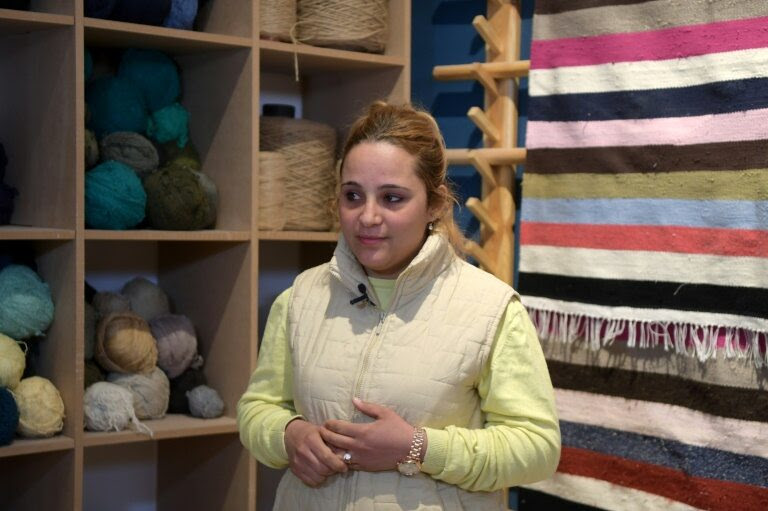Najet learned to weave as a child with her mother, quilts or kashabiyas (jellabas)”, she has, 52 years. Today, she devotes herself to kilims: “I earn a good living and I work at home.
Initially, it was a family order with her nephew, Mehdi Baccouche, a 33-year-old Franco-Tunisian, who had the idea in 2014 to order carpets for friends. From a simple page on Facebook (“El Mensej”, the loom), the project grew, giving birth in 2016 to the association Shanti, which buys the carpets in advance and takes care of the resale.
To date, it supports or brings an income to 12 craftswomen in the poor oasis of Nefta, 500 km south of Tunis. By inserting the wool in the weft, Najet shows the patterns with pride. “It comes out of my imagination, I prepared lines of colors and they (Shanti) have accepted.
All the old clothes, the old t-shirts or the socks that serve as raw material for a beautiful black, beige and gold carpet, come from the local market.

The nephew, Shanti, has also opened a haberdashery in Nefta where craftswomen get free supplies of multicoloured balls, from second-hand clothes or unsold industrial goods. No risk of shortage: the Tunisian textile sector has 1,600 manufacturers, and subcontractors of European brands.
The great idea of Shantiest to have created the haberdashery “makes a huge difference”. Before, “the craftswomen had to find and pay for all the raw material, earning 40 or 50 dinars (12 to 15 euros) with a kilim.
The income is correct, as each standard carpet (1.80 m by 2) now brings them 120 dinars. The association also improves their working space, for example by installing air conditioning in this torrid region in summer.
In relation to this new activity, these women also see their social role revalorized. “People look at them differently and training with designers gives them an opening to the outside world,” according to Fatima.
It is clear that the start was difficult and that they had to face mockery. “This popular art” of recycling thrift store items was called “old ladies’ work.” “It was important to show that you can be a woman who has no education, who does not know how to use the Internet, but who can have an activity and live from it,” he said, recalling the low employment rate of women in the South.
The organization orders a maximum of four carpets per month per woman to avoid any overload, and ensures that the work “is not too disruptive for the family balance”. The money for the carpets is not paid in cash but into postal accounts in their names. To prevent their husbands from charging them to “pay for groceries, electricity or the children’s schooling,” according to Baccouche.
The success of helping, “these learnings made along the way”, Shanti has applied its system of pre-purchase to other handicrafts, offered in a solidarity store in Tunis: “L’Artisanerie”.
Everything is included and this space also houses the creators and coordinators, who accompany more and more artisans from other regions such as Ain Draham (West) for rattan furniture, Tabarka (North) for pottery or Mahdia (East) for embroidery. In four years, 200 artisans have found outlets for their creations and 60 work daily for “L’Artisanerie”.
The objective is to demonstrate “That we try to show that we can do 100% Tunisian, with raw materials and Tunisian know-how, but a design adapted to the taste of the day,” says Mr. Baccouche.
Virtually all items “co-created” by Shanti with the artisans are sold to “Tunisian lovers of decoration” or shipped abroad. Institutions and companies also place large orders (164 recycled denim carpets last year for Indigo, supplier of Mango or Zara).
“It is a whole chain of production and logistics eco-responsible that we try to put in place,” says Baccouche.
Currently, the carpets sold do not cover the costs, hence the need for Shanti to be helped by partners like Oxfam or Denmark. Especially since the incubator has just extended its projects to sustainable agriculture and ecotourism.



Comment here